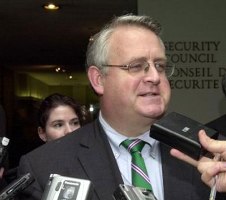US prepares for new push in Sudan’s Darfur
January 7, 2008 (WASHINGTON) — The Bush administration is preparing a new push to end the conflict in Sudan’s western Darfur region and keep a fragile north-south peace deal from unraveling in the vast African state.

The envoy, Richard “Rich” Williamson, was sworn in by Secretary of State Condoleezza Rice on Monday, after his predecessor, Andrew Natsios, resigned last month. Natsios, a former administrator of the U.S. Agency for International Development, was said to have been frustrated by internal bureaucratic battles over the direction of Sudan policy.
Darfur advocates have praised Bush’s choice of Williamson as key to overcoming those hurdles, noting the Illinois Republican has close ties to administration heavyweights, particularly Deputy Secretary of State John Negroponte. Williamson was Negroponte’s No. 2 when Negroponte was U.S. Ambassador to the United Nations from 2001 to 2004.
Williamson takes over just a week after a joint African Union-U.N. force took over peacekeeping duties in Darfur on New Year’s Eve despite chronic shortages of staff and equipment and less than adequate cooperation from the Sudanese government, which is accused of fomenting the violence.
That same day, Bush signed legislation that lets states and local governments cut investment ties with Sudan over Darfur. The law complements wide-ranging U.S. sanctions already imposed on Sudan and senior members of its government allegedly involved in the Darfur crisis that the United States has labeled a genocide.
The 4 1/2-year-old Darfur conflict has killed more than 200,000 people and driven 2.5 million from their homes since the region’s ethnic African rebels began fighting the Arab-dominated Sudanese government and its militia allies in 2003.
Williamson plans to consult with Congress this week and then with the United Nations before visiting Sudan in coming weeks to step up pressure on authorities in Khartoum to ease restrictions on the hybrid peacekeeping mission, officials said. He also will be urging greater contributions to the force, known as UNAMID.
The long-awaited AU-UN force — with just 9,000 soldiers and police — is only a little larger than the beleaguered and ineffectual African Union peacekeeping mission it replaced. And, even in the best-case scenario, it will take months to build up to its planned strength of 26,000.
Western nations have not come through with equipment such as military helicopters and vehicles the U.N. says are vital for the new force to reach hotspots quickly and protect civilians. The Sudanese government, meanwhile, has erected numerous obstacles, including insisting that the force be African and rejecting Western contributions of engineers.
When he signed the divestment legislation on Dec. 31, Bush said he would keep pushing for major improvements for the Sudanese people through “sanctions against the government of Sudan and high-level diplomatic engagement, and by supporting the deployment of peacekeepers in Darfur.”
And, in announcing Williamson’s appointment on Dec. 21, the White House said the United States would continue “to lead international efforts to deploy a large and effective peacekeeping force to Darfur, and implement the north-south peace agreement while providing for the humanitarian needs of conflict-affected populations across Sudan.”
That north-south peace accord, negotiated in 2005 with considerable U.S. involvement, is now fraying and many see it as a template for a Darfur agreement and fear its collapse could engulf Sudan in widespread conflict, fracturing the country and throwing the region into turmoil.
Meanwhile, on Monday, one of the largest U.S.-based Darfur advocacy groups announced it had chosen a new president to lead its lobbying efforts.
After a six-month search, the Save Darfur Coalition named Jerry Fowler, an official with the U.S. Holocaust Memorial Museum, to be its executive director.
(AP)
